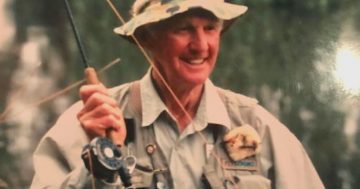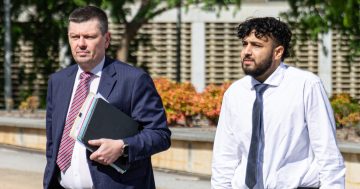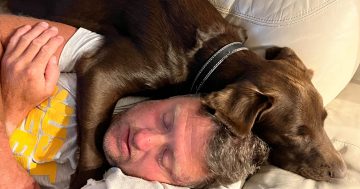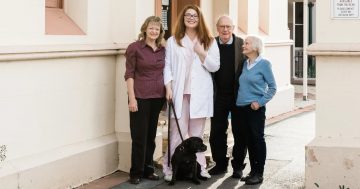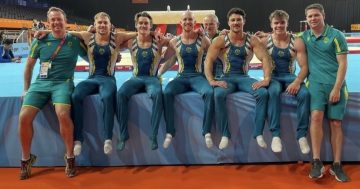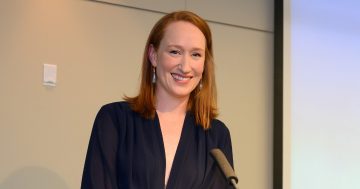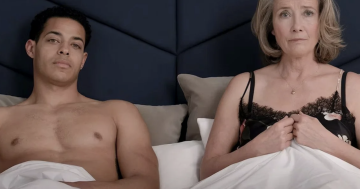
[If you’re coming in late, start at Part 1]
After one beer, he left Terry and Amanda but he didn’t go back to the house. He didn’t want to intrude. He didn’t want to talk to anyone or explain his sad fucked up life. He didn’t want to engage with hippies, no matter how cute and European they were. He rode his bike to his mother’s house and loaded it into the back of her Subaru station wagon. He had a key. He didn’t want to talk to his mother either, so he jumped in the car and drove, leaving the city, passing through Queanbeyan, out into the county. Paddocks and pine plantations. He pulled off into a dusty, makeshift car park and wrestled his mountain bike from the back of the car.
Sparrow Hill.
Forty kilometres of single track, hand crafted and loved by the local mountain bike community. A tonic for the senses. Over the fence and in the saddle the world disappeared, obscured by the dark pine shade and fine dust kicked up from nobbled tyres. There was only one way, one track, one direction. No decisions, just ride.
As dark descended he returned and pulled up in front of his mother’s house. Handbrake on. Streetlight glare. The house lit up. His mother was home. He unloaded his bike, locked the car and rode off down the street.
At Terry’s house there were human shapes moving behind every window. A hippie shadow-puppet show for the neighbours, who were no doubt horrified by the invasion of the kombi brigade. House prices may be affected. It was that serious. They were all still here, filling up the house.
Paul could see someone smoking near the front door so he decided to slip through the side gate to the back door, past the garden shed that was being crushed by privet and torn apart by ivy. He stumbled into the backyard like Harry Butler and Raymond was there, talking loudly into a mobile phone, unaware of Paul’s presence.
“Well, I’m back in town and I’d like to see her,” said Raymond.
Phone pause while Raymond listened. Paul stood still in the shadows of the yard. Awkward.
“I know, but she’s my daughter too.” Pause. “I know it’s been a long time.”
Pause. Long pause.
“I’m not here to interfere in your life…yes…yes…I know your career. I know. I’m not going to cause…I’m not here to…”
Silence.
“Oh man.” Raymond flipped his phone closed. Paul waited. Raymond turned abruptly and disappeared back inside the house.
Paul went in the back door and made for his room nodding politely and giving a general ‘Hi’ as he passed through the crowded kitchen. They smiled and looked happy in their new home, thank you very much. As he closed his bedroom door behind him he re-experienced the shock of knowing his life had been reduced to fit within these four walls. It was a kind of shame. He had lived a life of bi-folding doors that opened to the deck, European appliances, polished hardwood floors and open-plan living. He had shared a home, he had built a life. With Melanie. He didn’t want it back, but he missed it.
He needed a shower. He needed to sleep.
Monday morning at work. Paul sat at his desk and stared at the screen. He thought about the weekend. The arrival of the Kombi. The house full of people. The party.
He stared at his screen. One of those instant messages appeared. It was from Trish, the Little Mermaid herself:
P – meet me for coffee 10:30 – urgent – T
Paul replied OK but I’ll have tea.
Another message – an email this time.
An email from Melanie.
He paused, hand above the mouse. He considered opening it but stopped himself. Leave it alone mate. Leave it. Leave. It.
Paul had ridden his bike to work. The morning had been crisp and clear. He had felt good. But as he rode away from the house, things had dulled. Normalness had set in, like the house was the sun and he was on a journey to the outer planets. The city spread out before him as he traced his way around the man-made Lake Burley Griffin heading towards the Parliamentary Triangle. The flat lake, the rolling green lawns punctuated by national monuments and institutions. The High Court. The National Gallery. And finally the federal environment department, housed in the stately John Gorton Building with its imposing sandstone facade. It was cold. Lifeless. It was work.
Paul looked around his section. People were busy working at their work-stations in little cubicles – committed public servants playing their part for the greater good. Like he should be. Earth to P – come in P.
“Paul. Paul,” Rose, the woman who sat at the desk next to his, was speaking.
He looked at her.
“Your phone – it’s ringing.”
P. Come in, P.
He grabbed it and immediately regretted his action.
“Paul, could I see you in my office – when you have a free moment.” It was Paul’s boss – Chris Watkins.
Paul spoke into the phone “Sure” but the line was dead.
“Bastard,” Paul muttered.
They had a term in the public service for managers like Chris Watkins – dead wood. He struggled to open a Word document, he called female staff ‘love’ and he wore a grey suit with grey shoes. He had moved up the ladder. He was permanent and couldn’t be demoted. They just shifted him around. He wore his pants high, held up by a thin black leatherette belt.
Paul was in the wrong job. The wrong section. The wrong life.
Paul had been working in the international section of the Australian Greenhouse Office. Great boss – Brigit Williams. Part of a great team – John Gardiner and Trish the mermaid. Plenty of money in the budget for international travel. An excellent negotiated salary. Constantly briefing the Minister at Parliament House.
Then he was moved. Sideways. To the Regional Hotspots Program. Hotspots was the Prime Minister’s idea, partly designed to boost his environmental credentials and partly to justify the sale of Telstra. The idea was simple – find the most vulnerable area and protect it. They told Paul that John Howard himself had requested him and he’d fallen for it. He’d taken the job to nowhere.
Paul took a deep breath, knocked and entered Watkins’ office.
“Yes, Chris? You wanted to see me?”
“Paul,” Watkins stood up from his desk and hitched up his pants. “That report from the consultant – we need to discuss some of the findings. The final recommendations look good to you?”
Incompetent bastard. Paul knew that Watkins had not read the report. He wanted to be spoonfed. He wanted Paul to cover for him. Watkins had a meeting with the Secretary that afternoon to discuss the consultant’s report and he had no idea what to say. Paul, who knew the report and its recommendations, decided he’d had enough. It was time to act.
“Well, Chris, it looked pretty straightforward to me.”
“Do we trust the consultant?” Watkins asked.
“The consultant was hand-picked by the Secretary himself,” said Paul.
In fact, Paul had picked the consultant. Watkins was so bad he was oblivious to the work that was going on in his own section. The consultant was an ex-employee of the Department who had been ‘paid out’ – retrenched – and had set up on his own. His tender was the cheapest. So cheap that the consultant was unable to travel and see the endangered eco-systems in question and had made recommendations based on GIS mapping, satellite and aerial photos. Against Paul’s advice, Watkins had paid too little for the consultant to do his job properly. Paul suspected the Secretary might question the report as being a little too thin on substance.
Watkins, however, seemed satisfied. “Good, I’m seeing the old goat at two.”
The old goat? Watkins had no idea.
Paul was in the wrong job. He had to get out.
“They’re shutting you down.” Trish was serious, whispering.
Paul stirred his tea. “When?”
He was unconcerned and seriously didn’t care.
“Four to six months – John was telling Elizabeth before our section meeting.” John Gardiner from Paul’s old section had moved up to SES level – Senior Executive. Unlike Paul.
“Canning Hotspots? It’s the Prime Minister’s own baby?”
“I know – but it’s becoming too controversial.”
Read: pork barrelling. They’d been a little too cute committing the Hotspots money in marginal seats.
“You’ll have no problems getting work in another section Paul,” said Trish, reaching out to touch his hand. “Did you want me to talk to John for you?” Her hand was still touching his.
“Not yet.” He was enjoying her touch. “I’ll give him a call in a couple of weeks.”
He drained his cup. She squeezed his hand. She leant forward. He obliged. The kiss was brief, but intimate. He got up to leave. She stayed seated.
“Thanks Trish, let me know if you hear anything else.”
Then out of the blue she said, “Paul, how about dinner tonight?”
He wasn’t ready for that – yet.
“I’m busy tonight – how about later in the week.” Month. Year.
“Sure – I’ll message you.”
Paul sat on a green grassy hill looking down on the lake and the city. He hated who he had become. He sat on the grass in his $979.00 suit. His skinny ankles in thin socks stuck out from the bottom of his pants that flapped in the breeze. His shoulders, hunched, were too big for the jacket. The tie hung down between his legs. He felt out of place. The grass, the lake, the blue sky mocked him. He was locked out. Locked in a suit. Shut in behind tinted glass. Breathing air conditioning all day long.
He would quit his job – it was an easy decision after all.
After lunch, sitting at his desk. Jacket: off. Tie: off. Shoes: off. Socks: off. Rose looked at him amused. “Joining a commune Paul?” She smiled. If only she knew.
He had walked barefoot back to the office. It was like he had never felt grass between his toes before. He kept his shoes off in honour of his decision to quit. He greeted people in the corridor, chatted to people in the lift. He looked in his inbox. Another email from Trish:
How about dinner Friday?
He replied.
Sounds great!
He left the email message from Melanie untouched – why spoil the moment?
He looked up. A red-faced Watkins stormed across the room. Shit.
Watkins stood over him. “Nandren – what are you playing at?”
“I took my shoes and socks off to walk on the grass…”
“Don’t give me that shit,” he leant down, lowered his voice. People were watching. “You think I’m a fool?”
“You want me to answer that?” Paul kept his chin up – eyes locked on Watkins, who hitched up his pants and made an effort to calm himself. Then he moved in close to Paul. His sweat visible. His voice a spiteful whisper. “I’m no fool, boy. You watch it.” He turned, and stalked away.
They’re shutting you down, Paul thought to himself rather calmly.
Rose looked shocked. She touched him on the arm. “Are you OK Paul?”
He grabbed his bag, shoes and socks and walked out.
“How was your day dear?” Terry sat in the lounge room. Cup of tea in hand. Amanda lay comatose on the lounge.
“I quit.”
There was a pause. Terry nodded.
“Good,” he smiled. “Good for you.”
“What’s happened?” Amanda sat up.
“Paul quit his job,” Terry explained.
She looked at Paul, and back to Terry.
”Does he do this often?”
“No, not often – so I think he might be serious.” Terry stood up and raised his mug. “Here’s to Paul, the ex-public servant.”
“Well, I think I quit,” said Paul. “I might have been sacked.”
“Even better – here’s to Paul, the sacked public servant!” Terry walked across the room and put an arm around Paul’s shoulder. “Tea?” he asked Paul.
“I hear you’ve quit your job, Paul.” Judy turned to him. They sat at the kitchen table eating Flatheads fish and chips.
“I guess I have,” said Paul. It was a known fact in the house. He had quit his job. A couple of people had said things to him. Patted him on the back. Congratulated him. For Paul, it hadn’t yet sunk in. Next to Judy sat Jess. She joined the conversation.
“I guess it must have been hard,” Jess said, “being a public servant.”
“No. The work was easy. I was paid a lot of money to do next to nothing.” As Paul spoke, he realised his mistake. He had misunderstood her.
“I meant – philosophically,” she said
“Oh, yes of course.” Philosophically. Idiot. “I suppose you have to be part of the system to change it,” Paul replied.
“Really?” Jess looked at him, amused
“Do you really believe that crap?” asked Judy.
“No, not really – but it sounded good. I couldn’t work under this government anyway. They wouldn’t know good environmental policy if it stood up in their soup.” One of his father’s sayings.
Raymond came in from the lounge room where the others were eating. He lent down and kissed Judy on the lips. Full on the lips. A comfortable, lover’s kiss. Paul concealed his surprise. This was an interesting twist.
“How’re things beautiful?” said Raymond to Judy who grabbed his hand and squeezed it. They kissed again. Paul looked down at his food. Then he looked across at Jess. She had her back turned. Raymond had been with Jess the night of the party. Raymond now openly kissing Judy in the kitchen. Hippies – what can you say?
“So, you’ve quit your job mate?” said Raymond.
“Yeah,” said Paul, who noticed his own Australian accent broaden when he spoke to Raymond.
“What were you working on anyway?” Raymond, who was still holding Judy’s hand, stepped closer to the table and squeezed in between Judy and Jess. Jess grabbed her plate, scraped her chair, got up and left the room. Raymond grabbed the chair and sat down.
“What were you working on?” repeated Raymond.
“Hotspots,” said Paul.
“Controversial. Did you make those recommendations?”
Paul checked himself. How did Raymond know about the review?
“I read about it in the paper. Someone leaked the review to the Labor party.”
“What? Who did?”
“Someone – was it you mate? Good on ya if it was.”
“When was this?”
“This arvo, heard it on PM”
Pennies dropping. Watkins thought Paul had leaked it. Bastard.
“So why quit? Why not take the money and do something good with it?”
“What? What money?”
“The huge amounts you’re paid to sit on your arse and polish your pants all day. Save it up, spend it.” Raymond suggested, “Or travel.”
“Or give it to a charity,” said Judy. “Some environmental cause.”
“Like the Natural Heritage Trust,” offered Raymond. “Think about it. The rich irony.”
Paul thought about it. Sure, the Department paid him good money. But could he return to work? Could he put up with Chris Watkins?
“My boss is a real bastard,” he said. He hadn’t handed in his resignation. He’d have to go back in at some point.
“House meeting!” Raymond was calling from the lounge room. A booming voice. Paul waited for the kettle to boil. Judy rinsed her cup.
“Another one?” Paul offered.
“No thanks – better get a move on.” She went into the lounge room. The others filed past him. Miyad came in the back door. With him were the three men Paul had met in the toilet on the night of the party. He had forgotten their names. He had seen them smoking in the backyard, talking on mobile phones, but that was all. When Paul and Miyad had gone to the shops to buy the fish and chips, Paul had asked about them.
“The less you know, the better,” Miyad had replied. Paul had his own suspicions.
He waited for the kettle to boil. Jonas stuck his head around the doorframe.
“You coming Paul?”
“I’m not sure I’m invited.”
“You live in the house don’t you?”
Yes, he lived in the house.
“OK everyone!” Raymond had the floor. Paul entered with his cup of tea. He found a spot on the carpet.
“First up, thanks to Terry for letting us stay in his house.” This statement was met with general approval. Amanda gave Terry a hug. That was sweet.
“Second, we all have to pull our weight. Living with this many people in one house will be tough.”
“Living in the same house with you will be tough.” It was Jonas who had spoken. Everyone laughed.
“True,” conceded Raymond. “But you all know the score. When we get annoyed or upset we let it out. We talk about it.”
There was general silence.
“Miyad will go with Khalil, Mahmood and Ali tonight. He’ll take the Corona. So we’ll only have the Kombi. Let’s try and coordinate our trips. Save time and petrol.” Raymond was a man who obviously enjoyed logistics and thrived on planning and control.
“Finally, the holiday is over,” continued Raymond. “Time to earn some money.” People in the room nodded. “On that front, Judy has some good news.” Raymond gestured for her to speak.
“I’ve picked up a three month contract in the Public Service,” said Judy. Paul raised his eyebrows. Judy – the Public Servant?
Jess spoke from across the room. “Which Department?” Her tone flat.
Judy turned to Jess “Does it make any difference?”
The room held its breath. Raymond stepped in.
“The money we earn will be put to good use – we all know that,” Raymond paused for effect. “In the meantime everyone, make sure Centrelink knows you’re here.”
Raymond looked around the room.
“Anything else?”
After the meeting. Everyone stood around, chatting. Someone was handing out beer. Music on the stereo. It looked like the beginning of another party. Paul signalled to Terry across the room. He needed to talk. He nudged passed Jonas and ran into Judy. On an impulse he touched her lightly on the arm, leant down and said, “Judy, you’ll make a great public servant.”
“Thanks Paul.” A cool response. He turned to find Terry. He was gone.
After the break-up Paul had taken the armchair, breaking up the longue suite they had purchased from Ikea, and crammed it into the corner of his bedroom. It was an act of bastardry trying to make a point to Melanie. Sure, she had the three-seater but where was the matching one-seater? See how clever he was? Good point, well made. What a dick.
His experiences living in group houses had taught him that he needed his own space. Fortunately, Terry’s house had big rooms. Tomorrow he would put a lock on the door. He sat in the pilfered armchair and took a breath.
Summary: He had walked out on his job. He had no income. He had inadvertently joined a commune. He had kissed a girl from the Czech Republic. He had hardly seen her, let alone spoken to her since. He was having dinner with Trish on Friday. He had kissed her. She had tasted of coffee. Oh yes – he had slept with Trish and been a bastard to Melanie. He was getting emails from Melanie. She had kicked him out and rightly so. Conclusion: Shit, no conclusion. No recommendations. No report that he could file under ‘life’.
He went to the bookcase built by his father Aiyaz Nandren back in 1967. A knocked together bookcase that Paul treasured. On the shelves – over 400 books. Aiyaz’s books. Paul had inherited the lot. There was a copy of “A House for Mr Biswas” signed by a man who had once met VS Naipaul in London. Battered copies of Orwell’s classics. Books with notes pencilled in the margins in Aiyaz’s illegible cursive. Some early Rushdie. Mostly postcolonial fiction. Paul’s own meagre collection of books stood alongside. Whitman, Melville, Twain. Paul had studied American literature as part of his Environmental Science degree. Go figure. There were some crime novels. Some novels that he had never read – some of Melanie’s books that he had spitefully taken on his departure – what a sad specimen he was.
Paul pulled a book from the shelf. His father’s favourite. The most valuable book in the collection. Things fall apart by Chinua Achebe. A first edition. “From Me to You – Mary” written on the inside cover. Paul’s father, Aiyaz Nandren, had come to Australia from Fiji as a young student on a scholarship. Aiyaz was a good student who got good results. He loved knowledge and sought out the academic life. He completed his doctorate, travelled and studied in Oxford and MIT and returned to Australia to a position as a lecturer at the Australian National University. His area of expertise – literature, and later, postcolonial literature. The students loved him, one student in particular. Her name was Mary Heywood. She received some extra tuition and, as a result, Paul’s brother David was conceived. Paul was to come much later.
It was a scandal at first, but Aiyaz Nandren made a good woman of Mary Heywood and life went along swimmingly, as Aiyaz would say. He used the King’s English half serious, half mocking. He loved words and books and ideas. He wasn’t so fond of children but he did his best.
Aiyaz Nandren had escaped his life in Fiji. His family was rich. They owned a textile business. His mother had gathered twenty potential brides, which was no easy task. His father came to Australia to find him and take him home but Aiyaz stood his ground. Eventually he broke away. He didn’t read the mail that they sent. He gave away the money that was deposited into his bank account. He rarely spoke of his family or of his life in Fiji. Breakfast in the Nandren house was Weetbix and toast, vegemite sandwiches for lunch, and sausages and three veg for dinner. Roast lamb on a Sunday. Later, when curry was served in the house, it was a pre-made sauce from a jar, just add chicken.
When Paul first experienced racism it struck him as absurd. Despite the fact that he knew how to get on the front foot and cover drive, the colour of his skin started to matter. Paul suffered the taunts. He was cheered on by his father. “Do your own thinking for yourself, son”
Things Fall Apart. Paul breathed out and read the W.B. Yeats poem, quoted on page one. He read out loud – like his father had done so often.
“Turning and turning in the widening gyre
The falcon cannot hear the falconer;
Things fall apart; the centre cannot hold;
Mere anarchy is loosed upon the world”
“That’s beautiful.”
He spun around. His door was open. Jess stood in the room.
“Where is it from?” She casually walked over and stood next to him. He passed her the book, opened at the front page. She stood close to him. He looked at her face as she read. Jess looked up at him.
“The centre cannot hold,” she quoted from the poem as she passed him the book.
She turned to the bookcase. “I love books.” She ran a finger along the spines, reading the titles with her head slightly tilted. She made a selection.
“Walt Whitman,” she announced to him. She flicked through the pages. She paused, turned to him and read, “I celebrate myself, and sing myself.” There was another pause as she continued reading, this time to herself, then closed the book and put it back on the shelf.
“Can I borrow a book?” she asked him.
“Of course.”
“What would you recommend?”
Paul looked at the book in his hands. Things Fall apart. How apt. He held it out to her. “This is good.”
She took it from him and opened it.
“Who’s Mary?”
“My mother,” said Paul. “It was a gift to my Father.”
“I’ll take good care of it.” He looked at her. He wanted to reach out and touch her. Instead he said: “Books must be read – not put on shelves.” It was Aiyaz talking. Paul could hear his father in his own words.
When Paul was sixteen, Aiyaz Nandren’s health began to falter. He was diagnosed with cancer. It was a terrible shock. Aiyaz refused treatment. “Let me die with my senses intact!” To everyone’s surprise, a few days after the cancer discovery, Aiyaz announced he would return to Fiji to see his family and show his sons the place of his birth. They arrived in Fiji the day before Colonel Rabuka decided that Fiji should be ruled by Fijians. Paul was thrust into the postcolonial hot pot. He was instantly recognisable as an Indian – but he wasn’t one. He couldn’t understand a word of what was being said but he knew his cousins were worried. They were a wealthy family, easily targeted. First, one of the uncle’s shops was burnt, then the police stood by as looters broke into the textile factory. The family were desperate to get out. It was proposed that Paul and David should marry their cousins and take them back to Australia as their brides. Aiyaz Nandren said nothing, just shook his head. He packed up his wife and two sons and flew out. At the airport an old Aunt gave Paul an envelope with instructions to give it to his father when they got back to Australia. The envelope contained a letter from a father to a lost son. A family portrait taken when Aiyaz was a boy. And a cheque for ten thousand pounds.
There was a pause.
“You remind me of my first year English lit lecturer,” Jess said.
“What did you study?”
“Teaching,” she laughed. “I was a high school teacher. English and drama – I was…” She let the statement hang.
“Not cut out for it?” She sat down on his bed. He sat in his chair.
“Let’s just say I was a bit too young. Not ready for the responsibility. There was a scandal. I resigned.”
“A scandal?”
“Oh – nothing juicy. My mother had got me this job at a private school in the hills. Rich parents. Fucked up kids. At the parent teacher night they asked me what was wrong with little Johnny. I told them the truth.” She smiled. “The principal called me in. Reprimanded me. I walked out.”
“How did it feel – to walk out?”
“Strange,” she paused. “Not as euphoric as I’d hoped.”
“I know what you mean.”
She looked at him.
“Do you think we ever really know who we are?” he said before he could stop himself. “ I’m sorry,” he mumbled, “I didn’t mean to…” He broke off.
She smiled. They sat in silence. This was better than he had hoped for. Finally she spoke.
“I actually came to ask you a favour.” She pushed herself up off the bed.
“Sure.”
“If you’re not going to work tomorrow, could you take me to the shops?
“Sure. I only have a bike – but you can borrow Terry’s.”
“OK, it’s a date” she said. She walked to the door. “You know, you should think about getting a lock.” She closed the door behind her.
“Sure,” he said to the empty room.
Had she used the word ‘date’?
First thing next morning he called work. “Rose? – This is Paul.”
“Paul – I’m so glad you called me. Things have been happening.”
“I’m just calling to say I’m not coming in today.”
She cut him off. “Paul – we’ve written an official letter of complaint to the Secretary. Watkins can’t keep getting away with it. We all agreed. We all signed it. We delivered it to the Secretary’s office yesterday.”
“You didn’t have to do that.”
“No Paul, this is important. We won’t tolerate it any longer. He’s sexist, he’s racist….he’s a pig.” Paul didn’t know what to say.
“Thanks Rose, it means a lot to me.”
She wasn’t finished. “Paul – stay away today but come back tomorrow. We all support you. Watkins needs to know that we won’t be intimidated.”
Rose had a good point. She was a determined woman who had fled Iran after the revolution and she had a way of making people do what she wanted. Maybe he wasn’t going to quit after all.
“OK Rose. I’ll see you tomorrow.”
With Jess. They were in the mall. No – worse than that. They were in the food court at the mall. Paul sat at a small table for two, bathed in fluorescent light. He waited for Jess to return with the chips. The place was crowded. Lunchtime. On a small stage in the middle of the food court a local dance group did the tango. The music was loud and distorted. The dancers were middle aged and they loved it. The instructor – a striking blonde in a red dress – had a permanent toothy smile. She glided. She smiled. She flicked her head dramatically. She was a scary woman.
Jess returned with the chips and a lamb kebab.
“I haven’t had a kebab for ages.” She took a bite and grabbed a chip.
“I thought you were a vegetarian?”
“I am.”
“What – philosophically?”
She spoke through a mouthful. “Oh – funny man.”
It had been an experience – shopping with Jess. She had gone into every up-market dress shop. Both department stores. Every shoe shop. She had tried on summer fashion and even a bikini (which he didn’t get to see). She had pulled out a plastic card and made some rather large purchases.
“Is Judy paying for all this?” Paul had joked.
“No. This is my money.” She had forced a laugh. At herself. Or at his joke. Hard to tell.
The blonde in the red dress had left the stage and was dancing herself through the crowd towards them. She grabbed a man by the arm – encouraging him to join her on the stage. There was a tussle. The more she encouraged him, the more the man pulled away. She gave up and continued weaving through the tables.
“So what else is there to do in Canberra?” Jess asked.
“Nothing.”
The woman in the red dress was dancing in his direction. His stomach dropped. Paul could see what was about to happen. He had a sign on his head. It read – “I’m in a vulnerable state – pick me!” He was anchored to his chair. There was nothing he could do. The dance instructor was on him. The fake smile. The heavy make-up.
She grabbed his arm. He looked at Jess. She was laughing. He resisted.
“Go on – do it!” Jess pushed him to his feet.
How fucking embarrassing. He got up and was pulled toward the stage, his head down. Jess was still laughing at him. On the stage he realised the depth of what he had done. The smiling blonde grabbed him around the waist. Thrust her groin into him. And flung him sideways. He lost balance for a moment and he was in her arms. She pulled him to his feet and pushed off across the stage. He was attached to her. He spun around. He saw faces of people eating lunch. People watching him.
He saw Melanie.
He kept spinning. He desperately tried to look back. She was gone. He looked for Melanie’s face again. He shook off the smiling dancer, stumbled out of her grasp, and stormed off the stage. He had seen her – he was sure. He looked into the faces of strangers. They seemed amused. Melanie was gone. He sat down at an empty table.
On Mount Ainslie they looked down on the city. The lake. The backdrop of the mountains.
“I came to Canberra on a school excursion.” Jess leant on the rail. “Year Eight. I remember. I kissed Patrick Jameson on the back seat of the bus”
“I hope you kissed him on the lips too.”
“Smart arse”
“Patrick Jameson was a lucky boy. You know, you strike me as a ‘back seat of the bus’ kind of girl.”
“What are you saying?” She turned to face him.
“You know – popular, pretty, bitchy…”
“Piss off.” She punched his arm.
“I bet you had dangly earrings – and a perm.”
“I did have a perm,” she confessed. She looked at him. “So if I was on the back seat, where were you sitting?”
“With the wogs.”
Awkward pause.
“You know, I hated myself back then,” she said, “my life was horrible.” They looked at the view.
“So, Paul, what happened back there on the stage?”
“Oh Nothing,” he replied. Just Paul’s fucked up life. On stage. Under lights. In the mall for God’s sake!
They looked at the view.
He said – “So, What’s going on between you and Raymond?”
She said – “Nothing,”
Fair enough, Paul thought. They stood silently, viewing.
“It’s well planned.”
“What is?”
“The city. I like it.”
A plan. That’s what he needed. His own private Walter Burley Griffin. Marion too. They had won an international prize to design the new capital. That’s what he needed. An international contest to sort out his shit.
Paul felt dark, tired of looking at the horizon. “Let’s go back.”
[This is Part 1 of Canberra author Jeff Thompson’s book “Faceless”. The full book is available for kindle or from the publisher Palmer Higgs
Watch this space for further parts. For all the parts to date check the tag.
Photo by Robert Sheie CC BY 2.0]











